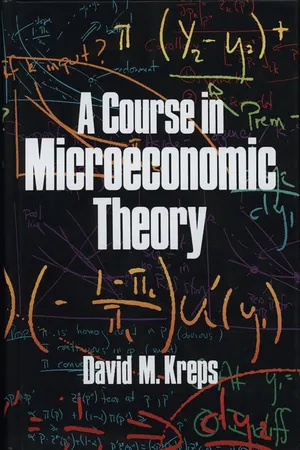A Course in Microeconomic Theory
About this book
David M. Kreps has developed a text in microeconomics that is both challenging and "user-friendly." The work is designed for the first-year graduate microeconomic theory course and is accessible to advanced undergraduates as well. Placing unusual emphasis on modern noncooperative game theory, it provides the student and instructor with a unified treatment of modern microeconomic theory--one that stresses the behavior of the individual actor (consumer or firm) in various institutional settings. The author has taken special pains to explore the fundamental assumptions of the theories and techniques studied, pointing out both strengths and weaknesses.
The book begins with an exposition of the standard models of choice and the market, with extra attention paid to choice under uncertainty and dynamic choice. General and partial equilibrium approaches are blended, so that the student sees these approaches as points along a continuum. The work then turns to more modern developments. Readers are introduced to noncooperative game theory and shown how to model games and determine solution concepts. Models with incomplete information, the folk theorem and reputation, and bilateral bargaining are covered in depth. Information economics is explored next. A closing discussion concerns firms as organizations and gives readers a taste of transaction-cost economics.
Frequently asked questions
- Essential is ideal for learners and professionals who enjoy exploring a wide range of subjects. Access the Essential Library with 800,000+ trusted titles and best-sellers across business, personal growth, and the humanities. Includes unlimited reading time and Standard Read Aloud voice.
- Complete: Perfect for advanced learners and researchers needing full, unrestricted access. Unlock 1.4M+ books across hundreds of subjects, including academic and specialized titles. The Complete Plan also includes advanced features like Premium Read Aloud and Research Assistant.
Please note we cannot support devices running on iOS 13 and Android 7 or earlier. Learn more about using the app.
Information
Table of contents
- Cover
- Title
- Copyright
- Dedication
- contents
- preface
- chapter one: An overview
- part I: Individual and social choice
- part II: The price mechanism
- part III: Noncooperative game theory
- part IV: Topics in information economics
- part V: Firms and transactions
- postscript
- appendix one: Constrained optimization
- appendix two: Dynamic programming
- index
